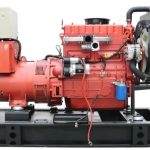Introduction
Diesel generators play a crucial role in providing backup power for control systems in various industries. These generators are known for their reliability, efficiency, and ability to quickly supply electricity during power outages. Control systems are essential for monitoring and managing various processes in industries such as manufacturing, healthcare, telecommunications, and transportation. The reliance on uninterrupted power supply for these systems makes diesel generators an essential component in ensuring smooth operations. This article explores the importance of diesel generators for control systems, their key features, benefits, and best practices for their maintenance and operation.
Importance of Diesel Generators for Control Systems
Control systems are used in a wide range of industries to automate processes, monitor performance, and ensure efficient operations. These systems rely heavily on a stable power supply to function effectively. Power outages can result in system failures, data loss, and potential safety hazards. Diesel generators serve as a reliable backup power source for control systems, ensuring continuous operation even during electricity disruptions. The ability of diesel generators to start quickly and provide power within seconds makes them ideal for critical applications where downtime is not an option.
In industries such as manufacturing, where production processes are automated and controlled by sophisticated systems, any interruption in power supply can lead to significant losses. Diesel generators act as a safeguard against such disruptions, allowing operations to continue seamlessly during blackouts or grid failures. Control systems in healthcare facilities, telecommunications networks, and transportation hubs also rely on diesel generators to maintain essential services and ensure the safety of personnel and equipment.
Key Features of Diesel Generators for Control Systems
1. Reliability: Diesel generators are known for their reliability and durability, making them suitable for providing backup power to critical control systems. These generators can operate continuously for extended periods, ensuring uninterrupted power supply during emergencies.
2. Quick Start-up: One of the key advantages of diesel generators is their ability to start quickly and provide power within seconds of a power outage. This feature is essential for control systems that require immediate backup power to prevent disruptions.
3. Fuel Efficiency: Diesel generators are more fuel-efficient compared to gasoline generators, making them a cost-effective option for long-term use. The higher energy density of diesel fuel allows diesel generators to generate more power with less fuel consumption.

4. Scalability: Diesel generators come in a wide range of sizes and power capacities, allowing businesses to choose a generator that meets their specific power requirements. Whether powering a small control room or an entire industrial facility, diesel generators can be scaled to suit the needs of the application.
5. Low Maintenance: Diesel generators are known for their low maintenance requirements and long service life. With proper care and regular servicing, diesel generators can operate reliably for many years, providing a dependable source of backup power for control systems.
Benefits of Diesel Generators for Control Systems
1. Increased Reliability: By providing a reliable backup power source, diesel generators help control systems maintain continuous operation and prevent downtime. 500kw diesel generator for remote environmental projects is crucial for industries where system failures can have serious consequences.
2. Improved Safety: Control systems in industries such as healthcare, transportation, and telecommunications play a critical role in ensuring safety and security. Diesel generators help maintain power supply to these systems during emergencies, reducing the risk of accidents or service disruptions.
3. Cost-Effective Power Supply: Diesel generators offer a cost-effective solution for providing backup power to control systems. Their fuel efficiency and long service life make them a reliable and economical choice for businesses looking to protect their operations from power outages.
4. Seamless Integration: Diesel generators can be seamlessly integrated into existing control systems, ensuring a smooth transition to backup power during emergencies. This integration allows businesses to maintain operational continuity without significant disruptions.
5. Environmental Considerations: While diesel generators are known for their emissions, modern models are designed to meet stringent environmental regulations. By investing in newer, more efficient diesel generators, businesses can minimize their impact on the environment while ensuring reliable backup power for control systems.
Best Practices for Diesel Generator Maintenance and Operation
1. Regular Maintenance: Proper maintenance is essential for ensuring the reliable operation of diesel generators. Regular inspections, oil changes, filter replacements, and testing of critical components are necessary to prevent breakdowns and ensure optimal performance.
2. Fuel Quality: Diesel generators are sensitive to fuel quality, and using contaminated or degraded fuel can lead to engine problems. Businesses should ensure that the diesel fuel used in generators is clean, properly stored, and meets the manufacturer's specifications.
3. Load Testing: Periodic load testing of diesel generators is essential to verify their capacity to handle the power requirements of control systems during emergencies. Load testing helps identify potential issues and ensures that the generator can perform as expected when needed.
4. Emergency Preparedness: Businesses should have a clear emergency response plan in place for power outages and other disruptions. This plan should include procedures for starting up the diesel generator, switching control systems to backup power, and restoring normal operations once power is restored.
5. Professional Service: While some maintenance tasks can be performed in-house, it is advisable to engage professional service technicians for more complex maintenance and repairs. Qualified technicians can identify and address potential issues before they escalate, ensuring the reliable operation of diesel generators.
Conclusion
Diesel generators play a vital role in providing backup power to control systems in various industries, ensuring continuous operation and preventing disruptions during power outages. The reliability, efficiency, and scalability of diesel generators make them an essential component of business continuity planning for organizations that rely on control systems for their operations. By following best practices for maintenance and operation, businesses can maximize the performance and longevity of their diesel generators, safeguarding their critical systems and processes. Investing in reliable diesel generators is a proactive step towards ensuring uninterrupted power supply for control systems and maintaining operational resilience in the face of unexpected emergencies.
